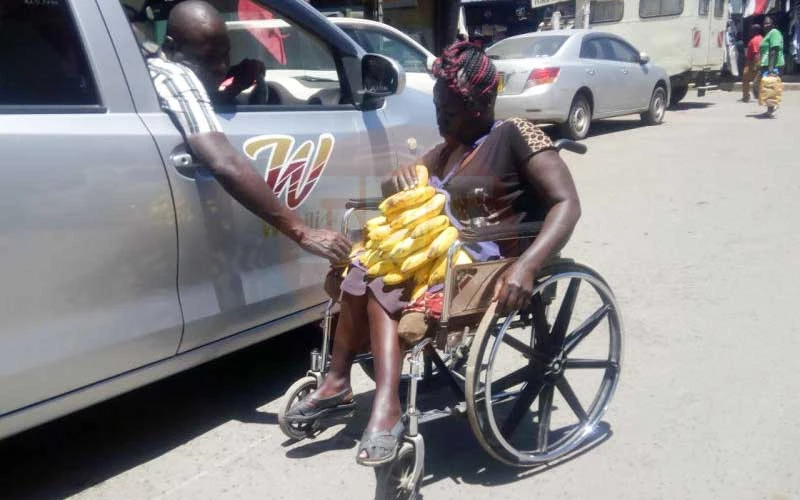In the bustling streets of Nakuru town, a remarkable woman defied the odds, becoming an inspiration to all who know her story. Eunice Atieno, 38, navigates the city’s Kenyatta Avenue on her wheelchair, a bunch of bananas proudly displayed on her lap.
Eunice’s journey began with adversity. Paralyzed by polio at the tender age of three, her life took a dramatic turn. Born in Nyakach, Kisumu, she was once a normal, vivacious child, full of life’s promise. However, the devastating blow of polio changed everything, and the once-promising life quickly spiraled into uncertainty.
Eunice’s early years were marked by financial hardship. Her parents couldn’t afford a wheelchair, forcing her to rely on crutches for more than two decades. The lack of accessibility and mobility hindered her education and prospects for a better future. By the age of 15, she had lost both her parents, leaving her feeling utterly alone in the world. She was forced to drop out of school at Class Eight, and life grew increasingly challenging.
In search of a fresh start, Eunice made the bold decision to leave Kisumu at the age of 21, eventually settling in Nakuru. Her life took an unexpected turn when she found love and started a family. However, the happiness was short-lived as her husband left after the birth of their third child.
She was left with the responsibility of caring for her children, paying rent, and the additional challenge of her physical disability. Faced with this daunting reality, Eunice had to make a painful choice.
“I became a beggar, something I had never dreamed of before. I had only two options; beg or starve to death, me and my children,” she recalls.
In 2009, with the help of generous well-wishers, she finally obtained a wheelchair. Initially, she hoped it would only be a temporary solution, but eight long years later, she was still on the streets, relying on charity.
Then, one fateful morning, Eunice decided she couldn’t continue begging. The act was suffocating her spirit, and she grew to despise the sound of coins dropping into her plate. This was her turning point.
“I woke up, threw the plate away, took the last Sh50 I had, and asked somebody to help me into a matatu to the market,” she said.
With that Sh50, Eunice bought a bunch of bananas at the market and, instead of returning to the streets as a beggar, she embarked on a new journey as a street vendor. Her presence among young, energetic hawkers and vendors was unusual, but she persevered. To her amazement, she sold out her entire batch of bananas and reinvested the earnings in more fruit. On her very first day in business, she made a profit of Sh150.
This success was a catalyst for her determination to leave behind the life of a beggar. Two years later, Eunice has grown her business. She now sells a variety of fruits, including mangoes, guavas, and oranges, from a bustling fruit stall on Kenyatta Avenue in Nakuru town. On good days, she makes up to Sh700.
Eunice’s message to others living with disabilities is clear: “Begging is not the solution, get something to do.”

